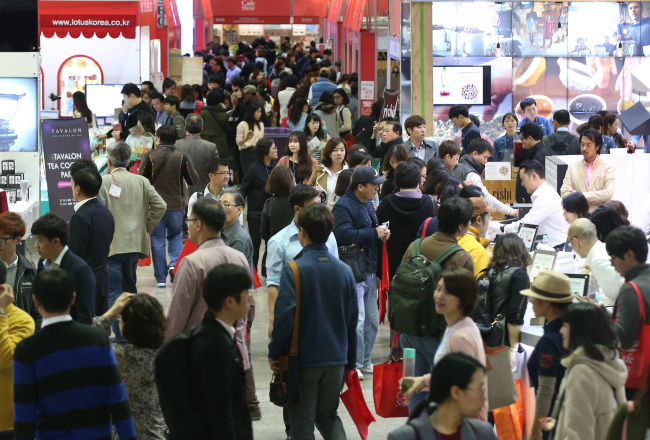Shin Yu-hee (not her real name), a 29-year-old office worker, is worried whenever she thinks about her parents’ postretirement years. Having graduated from a private women’s colleges in Seoul, she currently makes about 2.5 million won ($2,120) a month working at a marketing firm. As she lives alone and supports herself in Seoul while her family is in Daejeon, she doesn’t have much opportunity to save.
“I know my parents don’t have anything ready for their postretirement expenses,” she told The Korea Herald. “I know I’ll have to support them once my father retires. I know they haven’t been able to save anything because they spent most of their income on me,” Shin said. While she feels she owes them support in their later years, it also pressures her into thinking that marriage and children in her own life may be an unrealistic luxury.
Shin’s problems are apparently shared among many South Koreans, who often feel obliged to support their offspring even after they go off to college, land a job and get married. Add that with low youth employment, an economic slowdown and soaring living expenses, saving for postretirement life has become a tough challenge.
“I know my parents don’t have anything ready for their postretirement expenses,” she told The Korea Herald. “I know I’ll have to support them once my father retires. I know they haven’t been able to save anything because they spent most of their income on me,” Shin said. While she feels she owes them support in their later years, it also pressures her into thinking that marriage and children in her own life may be an unrealistic luxury.
Shin’s problems are apparently shared among many South Koreans, who often feel obliged to support their offspring even after they go off to college, land a job and get married. Add that with low youth employment, an economic slowdown and soaring living expenses, saving for postretirement life has become a tough challenge.

According to the report released by the KB Financial Group Research Center, which surveyed 2,906 Koreans aged 25-59 nationwide on their household finances, Koreans need an average monthly income of 2.26 million won for postretirement expenses.
However, based on the surveyed individuals’ savings, public and private pension plans and other financial assets, they only had an average monthly income of 1.1 million won for their postretirement days.
The report showed that married couples with children are more vulnerable to postretirement income risks, as they tend to sacrifice their retirement savings for their children’s education and wedding costs.
According to the report, married couples with children require an average monthly income of 2.52 million won postretirement, but they only end up saving 43 percent of the needed funds.
Married couples without children are currently saving 63 percent of the needed funds for their postretirement expenses, which is 2.21 million won a month.
Among all occupations, public servants were best prepared for their postretirement days, saving 70.7 percent of the required funds needed after retirement. Self-employed workers were saving 45.2 percent of the needed funds, while high-earning professionals, such as doctors and lawyers, were saving 57.8 percent.
Those who felt they weren’t financially prepared for their postretirement years said they didn’t have enough income, they were spending too much on their children or they had too much debt to pay off.
In October, a report released by the National Pension Research Institute showed that transfer payments, such as social retirement benefits and public pension payments, only make up about 28.8 percent of the average income of Korean elderly, with almost 50 percent of the elderly living below the poverty line.
The high poverty rate and inadequate public transfer payments mean that most Korean elderly must stay employed, even if they don’t want to, or financially depend on family members or children in order to live above the poverty line, the report claimed.
The paper also showed that 46.9 percent of the Korean elderly population lived in poverty -- defined as having income of less than half the median national income -- as of last year. The number was significantly higher than those of other developed nations, such as Norway (1.5 percent), the U.K. (7.9 percent), the U.S. (19.3 percent) and Taiwan (26.6 percent).
In countries such as Denmark, Poland, the U.K., Finland, Australia and Canada, public transfer payments, such as pension payments, retirement benefits and living allowance, accounted for at least 70 percent of the average income of the elderly population.
By Claire Lee (dyc@heraldcorp.com)



![[AtoZ into Korean mind] Humor in Korea: Navigating the line between what's funny and not](http://res.heraldm.com/phpwas/restmb_idxmake.php?idx=644&simg=/content/image/2024/04/22/20240422050642_0.jpg&u=)
![[Exclusive] Korean military set to ban iPhones over 'security' concerns](http://res.heraldm.com/phpwas/restmb_idxmake.php?idx=644&simg=/content/image/2024/04/23/20240423050599_0.jpg&u=20240423183955)



![[Graphic News] 77% of young Koreans still financially dependent](http://res.heraldm.com/phpwas/restmb_idxmake.php?idx=644&simg=/content/image/2024/04/22/20240422050762_0.gif&u=)
![[Herald Interview] Why Toss invited hackers to penetrate its system](http://res.heraldm.com/phpwas/restmb_idxmake.php?idx=644&simg=/content/image/2024/04/22/20240422050569_0.jpg&u=20240422150649)





![[Exclusive] Korean military to ban iPhones over security issues](http://res.heraldm.com/phpwas/restmb_idxmake.php?idx=652&simg=/content/image/2024/04/23/20240423050599_0.jpg&u=20240423183955)



![[Today’s K-pop] Ateez confirms US tour details](http://res.heraldm.com/phpwas/restmb_idxmake.php?idx=642&simg=/content/image/2024/04/23/20240423050700_0.jpg&u=)